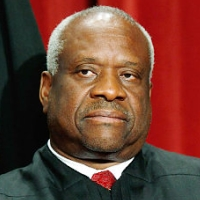A Supreme Court Justice’s Dream for the U.S.: A Nation in Which States Can Establish Their Own Religion
 Justice Clarence Thomas
Justice Clarence Thomas
One member of the nation’s highest court seems to believe that states should be able to establish an official religion, despite the constitutional ban on government from doing such a thing.
As part of the recent ruling in Town of Greece v. Galloway (pdf), which sanctioned prayers before local government meetings, Justice Clarence Thomas offered his own separate opinion while siding with the majority ruling.
Thomas, a conservative’s conservative on the court for 23 years, offered a decidedly different—and what some called radical—take on the Constitution’s Establishment Clause. Scholars and justices have long held that this clause prohibits the government (federal, state and local) from designating an official religion.
As for the U.S. government playing favorites with a particular church, the Establishment Clause clearly states: “Congress shall make no law respecting an establishment of religion.”
After the nation adopted the 14th Amendment in 1868 (following the Civil War), the Supreme Court decided that this provision applied the Establishment Clause to states and local governments as well.
But Thomas doesn’t see things this way.
In his concurring but separate opinion, Thomas wrote: “As an initial matter, the [Establishment] Clause probably prohibits Congress from establishing a national religion.”
Probably?
The use of “probably” raised eyebrows among many legal experts and court observers, some of whom wrote that Thomas seemed to be saying that state governments are not prohibited from establishing an official religion.
Jason Steed, an attorney with Bell Nunnally & Martin who handles appellate cases, wrote: “In other words, according to Thomas, though it’s impermissible for the federal government to establish an official religion, an official state religion might be just fine.”
Marci Hamilton, a religious scholar at Cardozo Law School, called Thomas’ view of state sponsorship of religion “radically subversive” and “federalism on steroids.”
“Without federal courts enforcing a national line on the separation of church and state, I have no doubt that states like Alabama and Mississippi would eagerly consider establishing Christianity as the state faith,” Hamilton told The New York Times.
-Noel Brinkerhoff
To Learn More:
Clarence Thomas’s Curious ‘Probably’: What Would the Founders Say? (by Alexandra Petri, Washington Post)
In Prayer Case, Supreme Court Justice Clarence Thomas Proves Critics Wrong (by Michael McGough, Los Angeles Times)
Does the Establishment Clause Apply to the States? (by Dorothy J. Samuels , New York Times)
Justice Thomas: State Religions Are OK (Thomas Reuters)
Establishing Extremism: Supreme Court Justice Argues That States Should Be Permitted To Set Up Official Religions (by Sarah Jones, Americans United)
U.S. Supreme Court Allows Sectarian Prayers at Government Meetings (by Noel Brinkerhoff and Danny Biederman, AllGov)
Are Poorest States Also Most Religious? (by Noel Brinkerhoff, AllGov)
- Top Stories
- Unusual News
- Where is the Money Going?
- Controversies
- U.S. and the World
- Appointments and Resignations
- Latest News
- Musk and Trump Fire Members of Congress
- Trump Calls for Violent Street Demonstrations Against Himself
- Trump Changes Name of Republican Party
- The 2024 Election By the Numbers
- Bashar al-Assad—The Fall of a Rabid AntiSemite






Comments